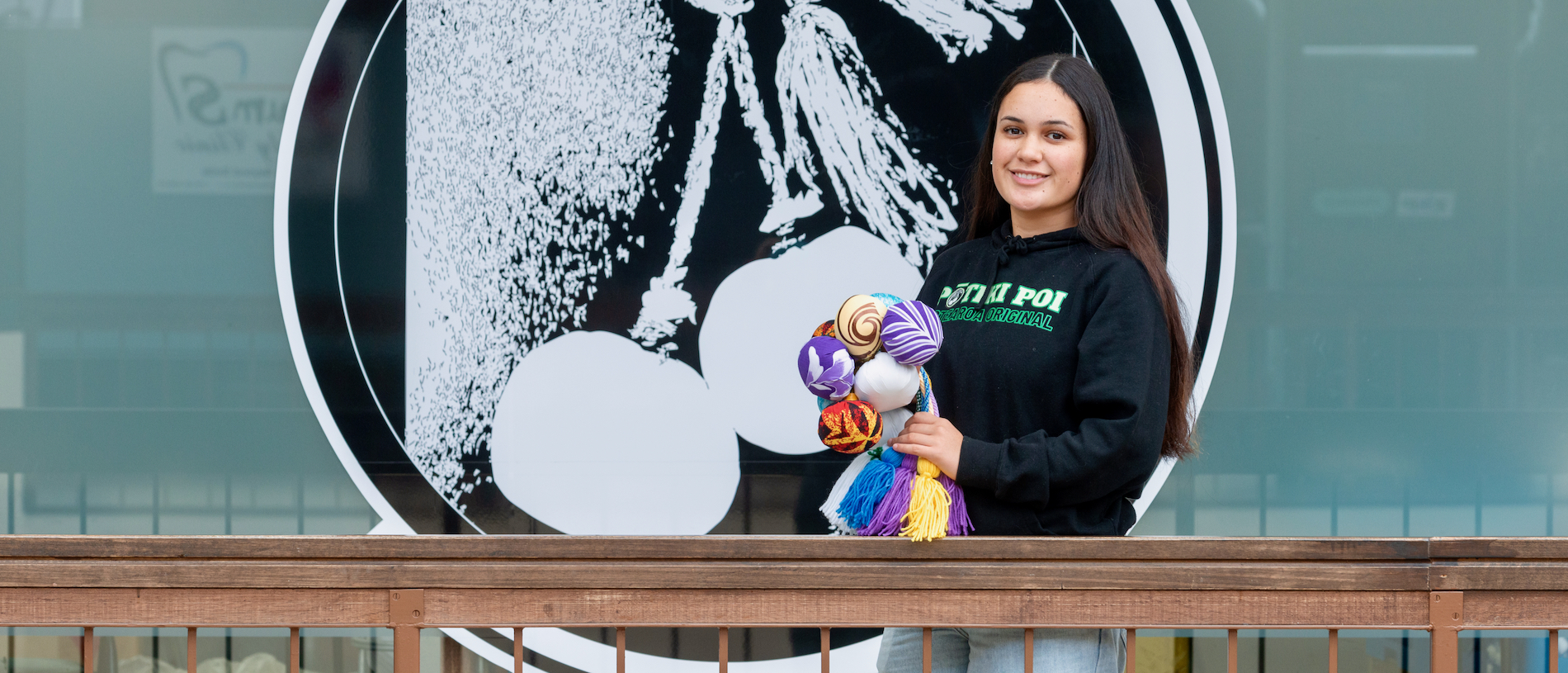
Georgia Latu – Pōtiki Poi
At the tender age of 12, Georgia Latu founded a company that would become the largest manufacturer of poi in the world.
The Dunedin teenager and student at Te Kura Kaupapa Māori o Ōtepoti is now 16 and balances her studies with running her successful company, Pōtiki Poi.
“I started Pōtiki Poi in 2019 as a fundraiser to go to wānanga (place of learning) in Rotorua,” Georgia explains. “But in just three days we managed to raise $1,000 which made me realise that making poi was more than just a fundraising opportunity, it was a business opportunity – not only for me, but for my community and my whānau.”

In 2019 Georgia and her mother, Anna Latu, had only ever made poi for themselves or as gifts, so after the initial success of the fundraiser, they had to learn how to scale up their production.
“The fundraiser was a kaupapa that we knew we could expand on. But we’d never seen something like that happen within our whānau before.”
Georgia attended the Soda Inc NZ Startup Bootcamp in Kirkiriroa Hamilton and Pōtiki Poi won the people’s choice award. “From that point things took off!” Georgia says.
Pōtiki Poi really hit the big time with the Women’s Rugby World Cup in 2022. The company were tasked with making 30,000 pairs of poi, and since then their poi are now sold in retailers across Aotearoa and Australia, including the gift shops at Te Papa and Waitangi.
One of Georgia’s motivations for starting the company was her younger brother, Api; pōtiki means ‘youngest child’ in te reo. "My brother was born in 2019 with Trisomy 21 (also known as Down Syndrome),” Georgia explains. “We realised, actually, people who have diverse abilities often aren’t getting paid well enough. We thought we could set up this business for Api so that when he’s old enough to work he can be paid a living wage. That is one of our core values.”
Today, at age 16, Georgia employs 40 staff and has infused the business with a social conscience. “We have employed a lot of our whānau because we wanted to give back and everyone is paid living wage.
“We also founded the company on a platform of tino rangatiratanga and being eco-friendly,” Georgia continues. “We try and use as many secondhand materials as possible to make our poi, normally sourced from op shops. We take the thousands of pillows from university halls of residence that would normally go into landfill and give them new purpose as poi. And we use biodegradable plastic.

“We're conscious that even as a pakihi iti (small business) we still have an important role to play in looking after papatūānuku.”
So, what makes a good poi? “I believe that poi is an extension of who you are,” Georgia says. “For me, it’s an extension of mana motuhake, tohu Māoritanga – my identity as a young Māori wāhine. But with the actual poi itself – what makes a good poi is the people who make it. With the aroha you put into a taonga, no matter how it looks at the time, it still holds mana and value.”
Having started a successful company at such a young age, one of Georgia’s biggest obstacles has been closely tied to her youth. “My biggest challenge is the fact that I still can’t legally own my business until I turn 18,” she explains.

But with challenges come support. “Without my whānau I wouldn’t have Pōtiki Poi. My mum is here, my nana is here; I’ve got aunties, uncles and cousins involved. Without them Pōtiki Poi would not be here. I owe it all to them.”
“I think Pōtiki Poi will remain in our whānau. It will remain a safe space to wānanga, to make poi and to revitalise taonga. That’s what I want for Pōtiki Poi, is to inspire.
“My vision for Pōtiki Poi is to continue revitalising as many taonga as we can. Not just poi, but tītītōrea (a traditional Māori stick game) and other Māori arts that are slowly coming back, I’d would love to share those with people.”
Story by Jo Percival, photos by Alan Dove for the Winter 2023 issue of AA Directions magazine.
